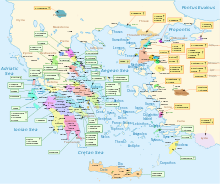Classic Greek
| Ancient Greek | |
|---|---|
|
Ἑλληνική Hellēnikḗ |
|

Inscription about the construction of the statue of Athena Parthenos in the Parthenon, 440/439 BC
|
|
| Region | eastern Mediterranean |
| Era | 9th century BC to the 6th century AD |
|
Indo-European
|
|
| Greek alphabet | |
| Language codes | |
| ISO 639-2 | |
| ISO 639-3 |
|
| Glottolog | anci1242 |

Map of Ancient (Homeric) Greece
|
|
Ancient Greek includes the forms of Greek used in ancient Greece and the ancient world from around the 9th century BC to the 6th century AD. It is often roughly divided into the Archaic period (9th to 6th centuries BC), Classical period (5th and 4th centuries BC), and Hellenistic period (3rd century BC to the 6th century AD). It is antedated in the second millennium BC by Mycenaean Greek.
The language of the Hellenistic phase is known as Koine (common). Koine is regarded as a separate historical stage of its own, although in its earliest form it closely resembled Attic Greek and in its latest form it approaches Medieval Greek. Prior to the Koine period, Greek of the classic and earlier periods included several regional dialects.
Ancient Greek was the language of Homer and of fifth-century Athenian historians, playwrights, and philosophers. It has contributed many words to English vocabulary and has been a standard subject of study in educational institutions of the Western world since the Renaissance. This article primarily contains information about the Epic and Classical phases of the language.
Ancient Greek was a pluricentric language, divided into many dialects. The main dialect groups are Attic and Ionic, Aeolic, Arcadocypriot, and Doric, many of them with several subdivisions. Some dialects are found in standardized literary forms used in literature, while others are attested only in inscriptions.
...
Wikipedia
